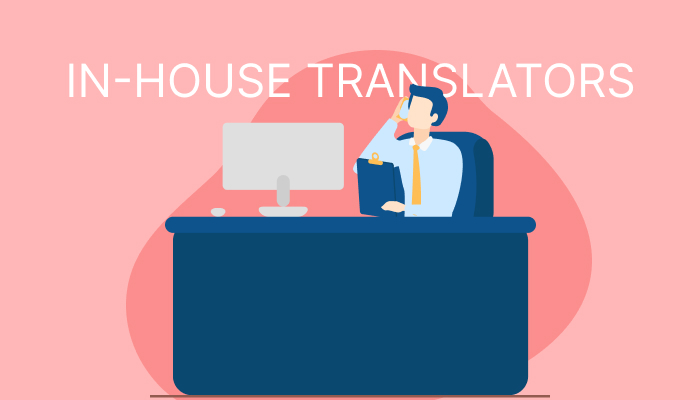 Mail
Mail
 Pocket
Pocket
Every business wants to expand. First, the expansion happens in the home region, and if the product or service is good, soon enough, the business will be ready to go global. Here’s where you, as a business owner, will need translation services.
From there, you have three roads ahead of you: you can build your in-house team of translators, contact a freelance worker, or send a request to a language service provider. The question is – who to choose? This question is what we will try to answer for you in this article.
Foremost, businesses that seek global growth will need translation services. When a company is ready to take on the global market, there are many challenges to overcome, and one of them is ensuring that your product or service will pique new customers’ interest. Moreover, the customers should understand what they see before them. Why is it important? Statistics already have an answer.
The thing is, 65% of customers choose companies that have content in their native language, while 40% of them refuse to interact with unlocalized content at all. Websites, store pages, social media, applications – every piece of information about you and what you offer should be relevant and clear to your future customers. People feel included and cared for when they can choose a language they understand – it demonstrates the company’s commitment. Consequently, customer satisfaction will grow and your company’s appeal will increase.
Translation will not only help you to reach your new audience, but it will also level the playing field. You will feel more confident going against local competitors if your promotional materials are localized or at least translated.

The in-house team is a team of selected professional translators who focus only on work for your company and do not engage in other projects. They are just your regular “on-site” employees, working on materials the company needs translating, attending meetings and training sessions, and using software and tools provided by the company. In-house translators have paid vacation, health insurance, and other benefits of office jobs.

Freelancers are independent contractors working for a variety of clients. They either work through agencies or by themselves, translating texts and other materials from one language to another. You can find these individuals on specialized freelance platforms, or you might also stumble on their work proposals in your work mail.
Language service providers (LSP) are companies specializing in translation and localization, offering these services to clients all over the world. For employees of these companies, translation is both a profession and a product. They constantly work to adopt new technologies and tools, attracting experts and local experts. When it comes to quality, LSP is unmatched. Let’s talk about these companies in detail.

No matter how big or small the company, language service providers will take on your request and complete it brilliantly. “One size fits all” is not a concept that applies to outsourced companies. When you contact an LSP, they will take a close look at your project and create a special translation plan based on your scale, capabilities, and budget. They will make sure to meet all your requirements and satisfy all your needs.
Language service providers adopt translation tools that significantly increase the consistency and quality of the translation. Such toolsets include translation management tools, translation memory systems, quality assurance, workflow management, computers to check the work of people, and people to double-check after the computers. Translation errors become a rarity. These tools come with a bonus, too. When the hard work is over, the LSP will provide you with translation memory that will help you keep future translations consistent.
Translation service providers offer more than just language. An entire team will be involved in your project. An LSP hires native translators, field experts, working professionals, local experts, and more skilled team members. Your team will possess an intimate knowledge of the field, the tools, and the language, producing consistent, high-quality translations. The experts in these companies are skilled with a variety of CATs, and the LSP usually owns the latest licensed versions.
Of course, with outsourcing, you can never have the same level of control as you would have with an in-house team. But an LSP will provide you with just enough control to feel safe about the fate of the project. Firstly, you will have full transparency – you will see who works on your translation and their qualifications. You will be in contact with project management every step of the way, and you will be able to monitor progress and make changes.
Outsourced companies, especially the big ones, have a large selection of different language pairs to work with. If you need a specific pair, they probably already have a bilingual translator ready to work. As a bonus, that translator might have a secondary education in the field you’re working in. Isn’t that swell?
Most of the time, contracting an LSP equals getting a high-quality translation with a price tag slightly above the freelancer’s paycheck. Cost, of course, depends on the scale of your project and the rarity of the chosen language pair, but it will still be way more cost-effective than hiring an in-house team. For example, you won’t have to pay the project management fee since it is already included in the estimated price of translation.
With a company, you will discuss the terms and have a clear layout of the price calculation. You can add only the services you need and opt out of those you find unnecessary. If you plan on a continuous partnership, you will get access to discounts and rebates.
Payment terms with LSP companies are suitable for business, and there are many payment options, both in currency (US, EU, RU) and via payment systems. The latter minimizes transfer fees. Invoices with a TAX ID can be offered if required.
By choosing to outsource, you will always know what you will get. There’s tangible proof of the company’s competence available through search and on-demand, manifested in case studies, success stories, and public client feedback.
Language service providers have a huge capacity and answer to tight deadlines. The working hours of the employees may not be 24/7, but the team will focus on your project alone, giving it more time than a freelancer would.
Good translation companies regularly undergo certifications. ISO certificates support the company’s claims of experience and quality. ISO is a high-level credential; freelance workers usually don’t have access to the certification or don’t bother going through it.
No matter how good the outsourcing translation agency is, they still aren’t people from your company with a profound knowledge of the product/service. At the start of your relationship with an LSP, you will have to hold meetings and explain important details about the project. And if you won’t continue working with the company, you will have to fill in the next one.
The large names of the industry have several work processes. Your project might not get most of their attention. On the other hand, a small company doesn’t mean the best quality either.
Sometimes word of mouth can become a great source for a good LSP. Ask your business partners if they have contacted any translation services before. Chances are, they did. If they are satisfied, they will gladly recommend a good service or save you money and trouble from contacting a bad one.
Of course, you can handle the entire process yourself, but do you have to? An experienced partner will be a great asset to your company. While someone prepares your materials for a global launch, you can focus on more important things.
The Palex team has provided the highest quality translation services in over 80 languages for 20 years. We hire the best language and subject experts all around the globe. If you are interested in outsourcing translation, contact us and get a free quote. By hiring the Palex team, you will get the best service and more:


